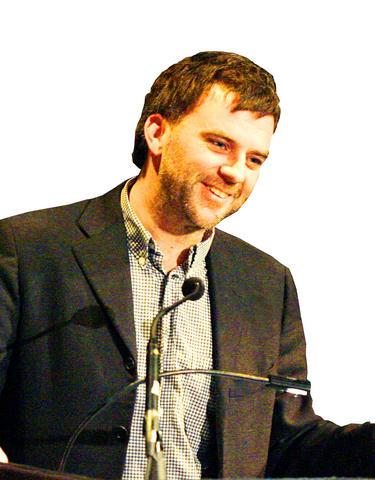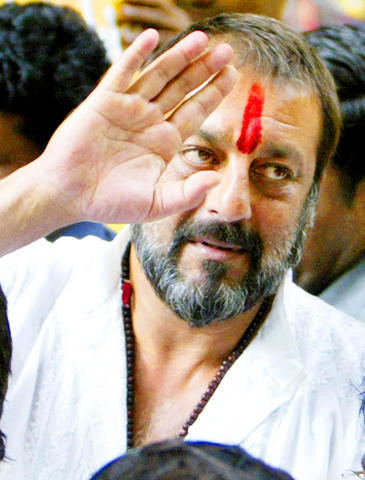The Berlin Film Festival announced the first of the movies that will compete for top honors at this coming February's festival with a raft of films from China, Brazil, Mexico, Britain, the US, Poland and Germany.
In Love We Trust (左右) from Chinese director Wang Xiaoshuai (王小帥), There Will Be Blood from US director Paul Thomas Anderson and Katyn from Oscar-winning Polish director Andrzej Wajda were all included in the lineup.
Never shy of tackling highly charged international political issues, organizers have also selected Oscar-winning documentary filmmaker Errol Morris' new movie S.O.P. Standard Operating Procedure, which examines abuse and torture of suspected terrorists at the hands of US forces at the Abu Ghraib prison.

PHOTO: AP
Also scheduled to premier at the 2008 Berlinale will be Kirschblueten - Hanami (Cherry Blossoms - Hanami) from leading German director Doris Doerrie and Brazilian box office hit Tropa de Elite (The Elite Squad) from director Jose Padilha.
Now in its 58th year, the Berlinale is one of the world's top three festivals along with Cannes and Venice.
US Commerce Secretary Carlos Gutierrez called on China to end its annual quota on foreign film imports.

PHOTO: AP
Gutierrez, in China for trade talks, said Beijing had imposed a routine temporary suspension on foreign film imports. China generally limits foreign film imports to about 20 a year to protect domestic filmmakers.
Last week, the Hollywood trade magazine Variety reported that China was banning all Hollywood movies for three months to protect local films. It said the ban would last until the end of February, but may be extended until May.
The report did not identify its sources and was quickly denied by Zhang Pimin (張丕民), deputy director-general of China's Film Bureau and the vice president of import and export business at state-run China Film Group.
A satirical Palestinian film that reverses the roles of occupier and occupied is one of three full-length feature films, along with a few shorts, shot in Palestine this year with relatively large budgets.
Enas Muthaffar's short film, Occupazion, shows Israeli protesters angrily waving blue and white Israeli flags while they demonstrate against Palestinian rule, one of them, wearing a headscarf, parodied of Palestinians'.
"Each Palestinian film made is a miracle," said George Khleifi, co-author of a book on the subject.
There's little official support for filmmakers, but Annemarie Jacir, director of Salt of this Sea, shot in the West Bank this year, obtained European funding of US$1.2 million.
The films tell stories through Palestinian eyes, trying to get beyond the simplicity of news coverage, which the artists say often reduces Palestinians to either militants or victims.
"Humor, passion, beauty, all of it is overlooked," said director Najwa Najjar, who just completed shooting a feature-length film about a female Palestinian dancer whose husband is sent to an Israeli prison.
Bollywood actor Sanjay Dutt is spending time with his family and friends before returning to work less than two weeks after being granted bail in an illegal weapons possession case, a news report said.
India's top court granted Dutt, a well-known actor, bail pending an appeal of his conviction on charges of unlawful possession of three automatic rifles and a pistol.
"I am enjoying the luxury of time before I get down to serious work," Dutt told the Times of India newspaper.
The actor said he needed to unwind before filming EMI, an acronym for easy monthly installments, in which he plays a loan recovery agent used by a bank to make defaulters pay up.
His last film was the 2006 hit Lage Raho Munnabhai (Carry on Munnabhai). A trial court sentenced Dutt to six years in prison in July for possessing weapons supplied by men subsequently convicted in the 1993 Mumbai bombings.
Dutt was acquitted in November 2006 of terrorism and conspiracy charges, but the actor has served nearly 20 months over three separate stretches in prison since he was first arrested in 1994.
"I have a strong belief in God, my loved ones, my fans, and most importantly in myself," Dutt said. "I will bounce back again."

Taiwanese chip-making giant Taiwan Semiconductor Manufacturing Co (TSMC) plans to invest a whopping US$100 billion in the US, after US President Donald Trump threatened to slap tariffs on overseas-made chips. TSMC is the world’s biggest maker of the critical technology that has become the lifeblood of the global economy. This week’s announcement takes the total amount TSMC has pledged to invest in the US to US$165 billion, which the company says is the “largest single foreign direct investment in US history.” It follows Trump’s accusations that Taiwan stole the US chip industry and his threats to impose tariffs of up to 100 percent

On a hillside overlooking Taichung are the remains of a village that never was. Half-formed houses abandoned by investors are slowly succumbing to the elements. Empty, save for the occasional explorer. Taiwan is full of these places. Factories, malls, hospitals, amusement parks, breweries, housing — all facing an unplanned but inevitable obsolescence. Urbex, short for urban exploration, is the practice of exploring and often photographing abandoned and derelict buildings. Many urban explorers choose not to disclose the locations of the sites, as a way of preserving the structures and preventing vandalism or looting. For artist and professor at NTNU and Taipei

The launch of DeepSeek-R1 AI by Hangzhou-based High-Flyer and subsequent impact reveals a lot about the state of the People’s Republic of China (PRC) today, both good and bad. It touches on the state of Chinese technology, innovation, intellectual property theft, sanctions busting smuggling, propaganda, geopolitics and as with everything in China, the power politics of the Chinese Communist Party (CCP). PLEASING XI JINPING DeepSeek’s creation is almost certainly no accident. In 2015 CCP Secretary General Xi Jinping (習近平) launched his Made in China 2025 program intended to move China away from low-end manufacturing into an innovative technological powerhouse, with Artificial Intelligence

Seawoman Second Class Stephane Villalon’s voice reverberated on the bridge of her Philippine ship as she issued a radio challenge to a much larger Chinese Coast Guard vessel in a disputed area of the South China Sea. The 152-centimeter-tall radio operator is one of the Philippine Coast Guard’s 81 “Angels of the Sea,” graduates of an all-women training program aimed at defusing encounters in the critical waterway. “China Coast Guard vessel 5303, this is Philippine Coast Guard vessel BRP Bagacay MRRV-4410. You are advised that you are currently sailing within the Philippine Exclusive Economic Zone,” she said during an encounter videotaped last